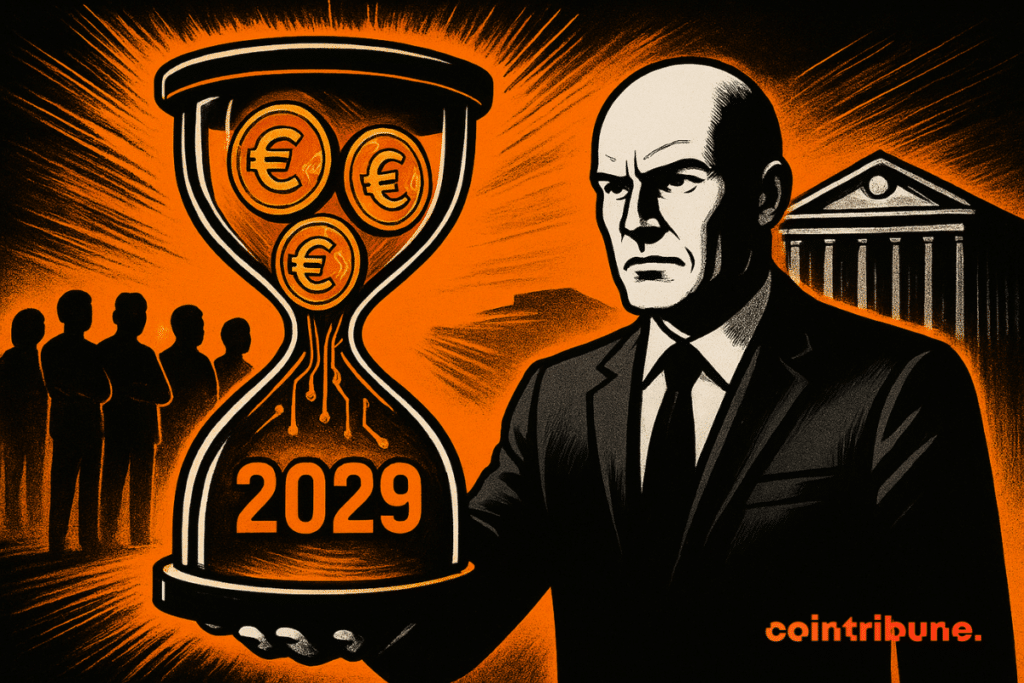Digital Euro Faces Delays: ECB Signals Launch Unlikely Before 2029
Europe’s digital euro may not be ready for mainstream use in the near or medium term, according to ECB Executive Board member Piero Cipollone. Despite recent progress in discussions and political negotiations, Cipollone noted that mid-2029 remains the most realistic timeframe for a launch, as key technical decisions are still pending.

In brief
- ECB’s Cipollone signals mid-2029 as the most realistic launch date for the digital euro project.
- European Parliament’s legislative approval remains the biggest hurdle to moving forward.
- EU member states aim to reach a general agreement on the digital euro by year-end.
- Technical debates continue, with options ranging from private ledgers to public blockchains.
Digital Euro Unlikely Before 2029 Despite Recent Progress
Speaking at Bloomberg’s Future of Finance event on Tuesday, Cipollone said the initiative made a major advancement last week after European finance officials established a framework for usage, control, and security.
Even with this recent progress, the ECB Executive Board member stressed that “the middle of 2029” is still the most likely timeline for a launch. He added that the ECB has been in active talks with all levels of EU member countries regarding the project.
Supposing Cipollone’s assessment holds, the time frame would signal yet another setback for the project, which started in 2020, as a move to strengthen Europe’s financial dominance amid the U.S. stablecoin push.
Parliamentary Approval Seen as Key to Progress
Cipollone explained that the European Parliament remains the biggest hurdle to a potential digital euro launch, as it has yet to give legislative approval.
He said EU member states should reach a general agreement by the end of this year. According to him, the Parliament is expected to take a formal position on the digital euro by May 2026.
We should arrive at a general approach, as they call it, an agreement among member-states by the end of the year.
Piero Cipollone
Irish Finance Minister and Eurogroup President Paschal Donohoe stated last Friday that the agreement allows EU ministers to discuss the digital euro in the Council of Ministers before the ECB makes a final decision on issuance.
Even as Cipollone points to mid-2029 as a possible launch date, European authorities are already laying the groundwork for CBDC preparations. The ECB has scheduled a meeting next month to discuss next steps, with an MEP expected to deliver a progress report on October 24.
Cipollone added that after the report is released, Parliament members will have six weeks to propose adjustments and an additional five months for deliberations.
Questions Remain Over Design and Implementation
Beyond the legislative impasse, the digital euro also faces major technical questions. According to reports, officials have considered launching the project on a public blockchain, such as Ethereum or Solana, after initially planning to build it on a private Eurosystem ledger.
Supporters argue that building on an open network would encourage widespread adoption, while critics point to concerns about privacy. Advocates believe a digital euro could strengthen retail payments by lowering costs and increasing transparency. Still, others remain skeptical about user privacy and how the proposed digital currency would coexist with banks and fiat-pegged assets.
Maximize your Cointribune experience with our "Read to Earn" program! For every article you read, earn points and access exclusive rewards. Sign up now and start earning benefits.

James Godstime is a crypto journalist and market analyst with over three years of experience in crypto, Web3, and finance. He simplifies complex and technical ideas to engage readers. Outside of work, he enjoys football and tennis, which he follows passionately.
The views, thoughts, and opinions expressed in this article belong solely to the author, and should not be taken as investment advice. Do your own research before taking any investment decisions.